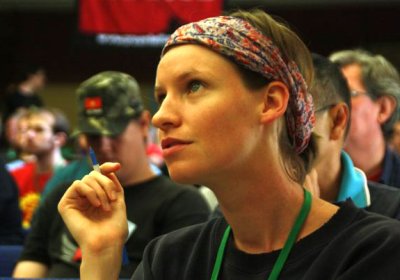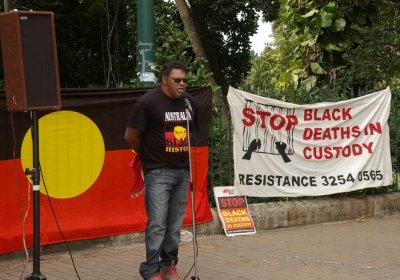In 2006, as Labor opposition leader, Kevin Rudd, made much of Dietrich Bonhoeffer, the German theologian, pastor and pacifist.
Bonhoeffer took part in the German resistance to the Nazi regime and helped German Jews escape the country.
Bonhoeffer was murdered by the Nazis in 1945.
For Rudd in 2006: “Bonhoeffer is, without doubt, the man I admire most in the history of the twentieth century. He was a man of faith. He was a man of reason. He was a man of letters … He was never a nationalist, always an internationalist. And above all, he was a man of action …”
Indigenous
On May 18, the Queensland Crime and Misconduct Commission (CMC) announced it would take over primary responsibility for investigating all deaths in police custody in the state.
This followed the recommendation made by deputy chief magistrate Brian Hine when he delivered his findings on May 14 to the third coronial inquest into the 2004 death of Aboriginal man Mulrunji Doomadgee in the Palm Island watch house.
On November 19, 2004, Mulrunji was walking home when sergeant Chris Hurley, driving by in his police vehicle, arrested him on a drunk and disorderly charge.
Lani’s Story
Click here for link
Review by Sanna Andrew
The documentary, Lani’s Story, follows the incredibly brave and courageous story of a young Aboriginal woman who not only endured and survived life threatening violence from her partner, but who goes on another harrowing journey long afterwards to bring the man to justice.
Plans are well underway in some states for the “Justice Bus Trips” in July to Alice Springs, where a gathering in defence of Aboriginal justice and human rights activities is being organised. Support for the Aboriginal rights movement has increased steadily over the past year, spurred in no small part by the historic Alyawarr people’s walk-off.
In July 2009, the Alyawarr people walked off their community of Ampilatwatja, which was prescribed as part of the Northern Territory Emergency Response — better known as the NT intervention.
More than 200 people rallied to call for an end to the Northern Territory intervention at Sydney Town Hall on May 28. Monica Morgan, from Amnesty International, told the crowd the intervention was forcing Aboriginal people off their lands and taking away their culture.
Morgan said this was the outcome of an ongoing process of assimilation that began in Sydney in 1788 and spread across the country. She said ongoing solidarity was necessary for Aboriginal people to survive as a culture.
Jess Moore, well-known community activist and part-time worker, will contest the seat of Cunningham on New South Wales’ south coast in the coming federal elections.
Moore, a member of Socialist Alliance, is a leading climate and renewable energy campaigner in Wollongong. She is active in the struggle for marriage equality and helped found the Illawarra Aboriginal Rights Group, set up in response to the racist Northern Territory intervention.
“One of the great scandals of Australia's history: Aboriginal labour in the 20th century”, was a the title of a lecture by Dr Ros Kidd in the Queensland Trades and Labour building on May 20.
The Alex Macdonald Memorial Lecture attracted about 80 people. It was organised by the Brisbane Labour History Association and sponsored by the Queensland Council of Unions (QCU).
Kidd's latest book, Trustees on Trial, documents the abuse and misappropriation of Aboriginal wages during the last century. "The fight for justice is still going on”, Kidd said.
Sam Watson, Aboriginal community leader and Socialist Alliance senate candidate for Queensland, spoke at a May 19 rally outside state parliament.
He called for the sacking of police commissioner Bob Atkinson; the charging and conviction of police who kill Indigenous prisoners; for investigation of police to be carried out by an independent, community panel; and for a new Royal Commission into Black deaths in custody.
Indigenous affairs minister Jenny Macklin has dismissed the findings of a Menzies School of Health Research report that found “income management” has failed to improve the health and wellbeing of the people it targets.
Income management was implemented by the then Coalition government in August 2007 on 73 targeted remote Aboriginal communities as part of the Northern Territory intervention.
Under the scheme, 50% of welfare recipients’ income is replaced with a Basics Card, which can be used to only buy food, clothing and medical supplies, and only in certain stores.
The new Ecological, Social Justice, Aboriginal Party is seeking federal, state and territory electoral registration, hoping to achieve it by the time the next federal election is called. If ESJAP is not registered, our candidates will contest as independents, coalesced under our banner.
ESJAP will strive to ensure the undiluted Aboriginal voice in parliament — a voice sorely missing from Australian politics. There have only been 19 Aboriginal parliamentarians at the state, territory and federal levels. Ten of those 19 have been in the Northern Territory.
The federal government’s $672 million Strategic Indigenous Housing and Infrastructure Project (SIHIP), has failed to improve Aboriginal housing in the Northern Territory. Only a handful of houses have been built and adequate repairs to existing current housing stock have not been made.
Announced in 2008, SIHIP promised 750 houses for chronically overcrowded Aboriginal communities. The project is running over budget but still failing to meet the needs of remote communities.
The coroner in the third inquest into the death in custody of Mulrunji Doomadgee on Palm Island in 2004, Queensland deputy chief magistrate Brian Hine, has handed down an “open finding”. This means no criminal charges will be laid against senior sergeant Chris Hurley. Delivering his report on May 14, Hine cited the unreliability of witnesses, who changed their stories many times throughout the various investigations and inquiries, as the reason for his inability to make a definitive finding. But he also said there was evidence of collusion by police officers to protect Hurley.
- Previous page
- Page 126
- Next page







